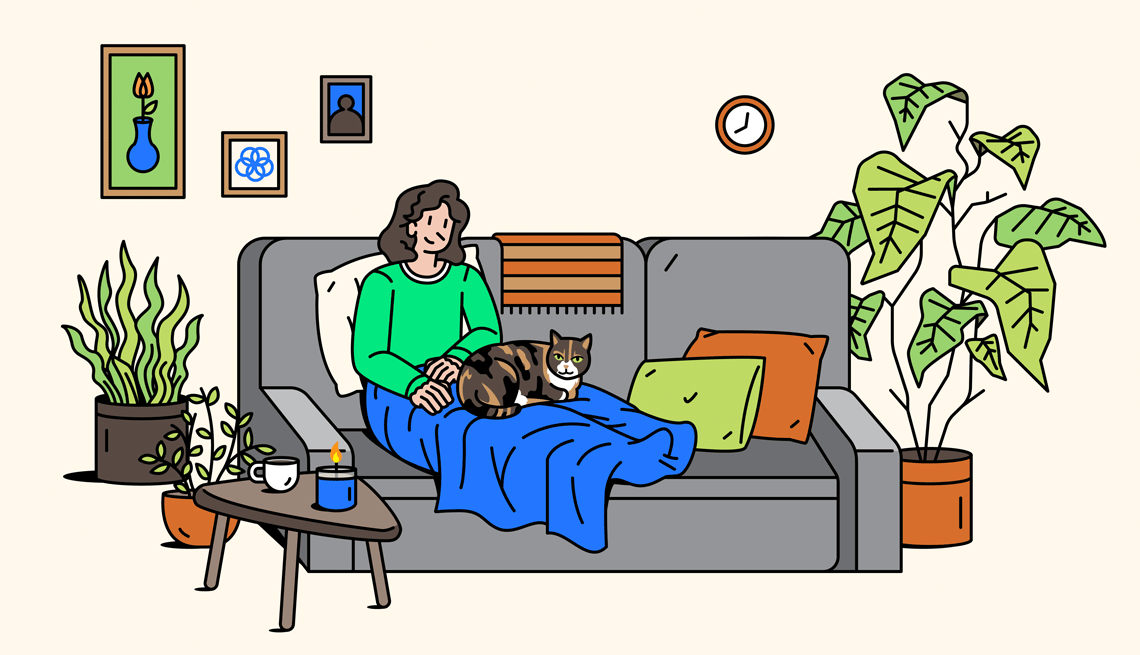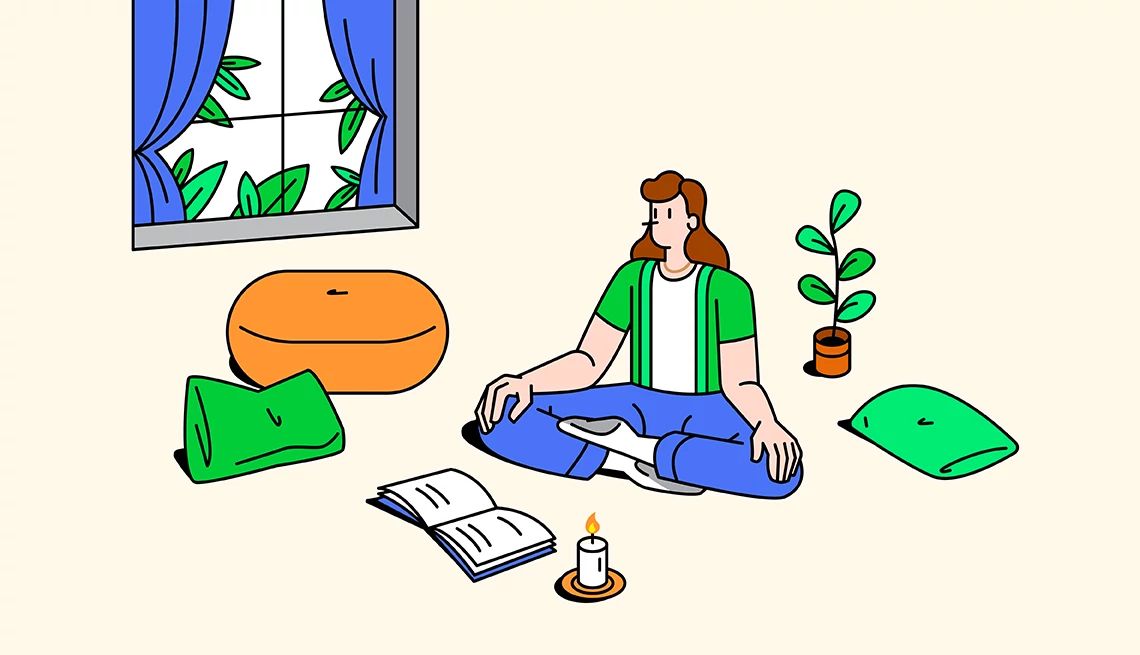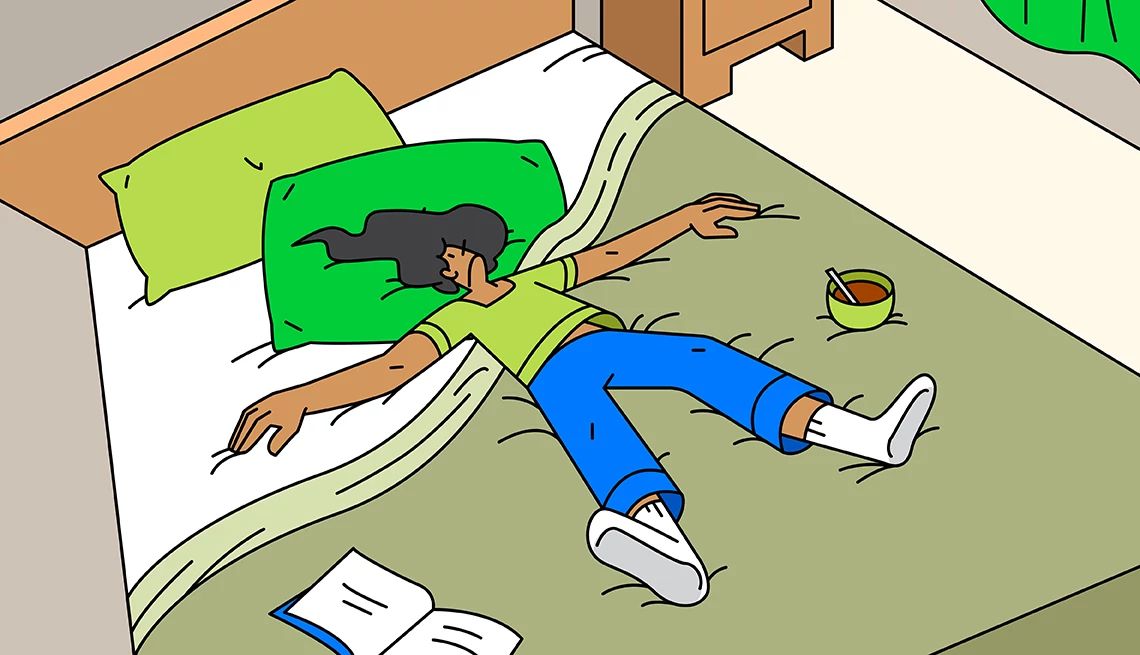AARP Hearing Center


Live alone as an older adult? Whatever the situation — by choice or after a divorce or loss of a partner — 27 percent of adults aged 60 and older live by themselves, according to the Pew Research Center.
The good news: Living alone isn’t necessarily a bad thing. You can create a living experience that is completely you, experts say. And all that personal space can feel like a huge sigh of wonderful.
“Contentment” and “competence” are two words that come to mind for 70-year-old Gwenn Voelckers, author of the book Alone and Content: Inspiring, Empowering Essays to Help Divorced and Widowed Women Feel Whole and Complete on Their Own.
“I think a big misconception is that choosing a solo life is selfish, whereas for many of us it means choosing a life — albeit unconventional — that is consistent with who we are, on our own terms and anchored in self-trust,” says Voelckers, a certified life coach from Honeoye Falls, New York, who has lived alone since her marriage ended, 39 years ago. “It is enabling and empowering.”
Ready to start looking at the good sides of having your own space? Here are 25 ways to celebrate living solo.
1. Skip the traditional ways rooms are used
Bella DePaulo, author of Single at Heart: The Power, Freedom, and Heart-filling Joy of Single Life and a social psychologist at the University of California, Santa Barbara, doesn’t believe we need to use the rooms in our house in traditional ways. In her home, what typically would be considered the living room is her office, dominated by an L-shaped desk and two tall bookcases. She could have used a guest bedroom for her work instead but prefers this one because it is the brightest and most spacious.
It also makes sense because she loves her career. “It is a big piece of what defines me,” says DePaulo. “It deserves a place of prominence in my home as well as my life.”
In her book, DePaulo mentions other unconventional room swappers, including a woman who shares her bedroom with a piano and another who transformed her living room into an agility training course for her dog.
Mary Van Keuren, a 65-year-old writer living in Macedon, New York, converted a bedroom into an exercise room, where she walks the treadmill and does physical therapy exercises for her arthritic knees.
Her mother occupied the bedroom for seven years before passing away, in 2023. “If there was a silver lining to her death, it was that I once again got my space back, and once again I realized how much I enjoy living alone,” says Van Keuren, who has lived alone most of her life; she divorced in 1987 and has no children. “I’m master of my own domain … I get to decide where things belong in the house.”
“When you depart from traditional ways, it makes you more creative,” says Carole Lieberman, M.D., a psychiatrist in Beverly Hills, Calif.
2. Act as if no one’s watching
“I can, and often do, just wear pajamas throughout the day,” and no one “looks askance” or makes “snarky comments,” Van Keuren says.
Van Keuren sometimes talks to herself, cries or mopes around without feeling pressured to explain her circumstances. When she works out and is “rolling around on my yoga mat like a beached walrus, I don’t need to worry about anyone seeing me,” she continues. “I don’t think I would work out half as much if I had a housemate.”
And she never needs to close the bathroom door “unless I want to keep the cats out.”
Adds Lieberman, “When we act as if no one’s watching, it frees us to enjoy ourselves completely.”
3. Relish being a hermit
Erika Holmes, a 52-year-old insurance sales manager in Nashville, Tennessee, says she needs a break from human beings several nights a week — especially Monday, Tuesday and Wednesday nights.
“It’s either my personality or it’s my job,” she says. “I just despise those days of the week — absolutely despise them — so I’m not in a good mood [and] do not want to be with other people.”
“Hermit time is how we refresh ourselves: by putting space between us and the unrelenting beat of the world,” says Lieberman.
4. Don’t apologize for being human
“While I don't necessarily want to admit that I am capable of such a thing, I will say that unpleasant bodily noises or smells are much easier to live with when there’s not someone else in the room,” says Van Keuren. “So after a nice dinner of chili or bean burritos, living alone is really a blessing for the rest of the world.”
Says Worthington: “Life has enough self-disappointments, failures and faux-pas moments to apologize about. Living alone removes one of the little ones.”
5. Create a sanctuary


This is about more than picking out paint colors and decorations. It’s about being able to create a space that represents what’s important to you and helps you feel at home: a “profound atmosphere” that is almost sacred, says DePaulo.
A sanctuary brings feelings of security, and you can make your home “a place of comfort and peace,” says DePaulo, whose TEDx talk, “What No One Ever Told You About People Who Are Single,” has been viewed nearly 2 million times. For her part, 71-year-old DePaulo, who has lived alone her entire life except for a brief time in graduate school, filled her home with plants, books and comfy furniture.
She also chose where she wanted to live and the kind of structure she wanted to live in: a home with lots of windows and a skylight, views of lush greenery and a peek of the Pacific Ocean.
“Having a safe space where one can experience solace from the ‘slings and arrows’ of daily life contributes to positive mental health,” says Everett Worthington, a licensed clinical psychologist in Henrico, Virginia.
6. Find strength
“You have to be a strong person, I think, to be alone,” says Paul O’Connor, 71. The retired fire captain from Prescott Valley, Arizona, is divorced and has lived on his own for the past eight years.
He describes how people who live together often share common interests. “I see many people do everything together, which is common in people our age,” O’Connor says. What happens when a pair is split by choice or death? “They’re lost, absolutely lost. That’s one thing I’m not.”
O’Connor credits his grandmother with setting him up to be strong and self-reliant. She taught him how to cook, sew, clean and do laundry. “She did not want me to ever be dependent on a woman,” he says.
Says Worthington: “Sometimes people can become dependent on mates, roommates or cohabitors. Living alone allows one to make independent decisions without second-guessing themselves as to whose idea the decision was.”
7. Bless your mess
A small pile of mail cluttering the kitchen counter. A couple pairs of shoes in a pile near the front door. Dust on the piano thick enough to write your name in. This is the kind of place that makes Voelckers feel comfortable. She prefers when a home looks “lived-in” rather than feeling the need to live up to someone else’s standards of order and cleanliness.
“I would be living in a state of tension if I had to compromise in that way,” she says.
Referencing childhood once more, Lieberman says that “just like kids love the freedom of playing with mud, a mess frees you from having to be perfect all the time.”
8. Cherish the quiet
Van Keuren has a friend whose home is always filled with the sounds of talk radio. Holmes has been with people who need to keep the television on day and night. Neither wants to be exposed to incessant, uninterrupted sounds.
“That would drive me up a wall if someone always had some kind of noise in the background,” Van Keuren says. “It’s easier to find a quiet space inside myself if I have quiet outside of myself.”
Holmes says this about the quiet: “I just kind of think it feeds your soul.”
It also feeds the mind. “Quiet times are a necessity for our brain to continue to function properly,” says Lieberman.







































































You Might Also Like
Retirement Mistake: Delaying Move to Retirement
After an interstate move, this couple struggled to find a community to call home
Make a Healthy Charcuterie Board
Prepare a charcuterie board that’s nutritious and delicious
Here’s What to Do With All Your Unwanted Stuff
Advice on how to sell, donate and recycle after you declutter